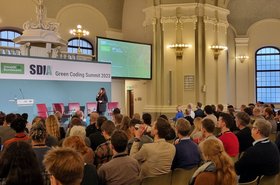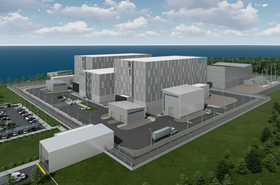After nearly ten years, I'm about to leave Datacenter Dynamics.
It feels as if I have accumulated more questions than answers over the last decade. So I'm glad to say I'm going somewhere where I can keep inquiring.
From next Tuesday, I will be at the Uptime Institute. I will keep asking questions - and so will the team here at DCD.
What issues are still open? Top of mind at the moment would probably be the OVHcloud fire.
OVHcloud - the burning question
I am leaving DCD on the third anniversary of the disastrous fire that consumed OVHcloud's SBG2 data center in Strasbourg On 10 March 2021. This was the most destructive data center fire ever, and there has never been an official report on what happened.
Little has emerged that wasn't known one year on, in 2022. The Bas-Rhin firefighters issued a report detailing their shock that the facility had no fire prevention system, no power cut-off, wooden floors, and an architecture that encouraged airflow, turning the building into a furnace.
An accident investigators' report repeated most of these criticisms, adding details such as water penetration in the electrical room where the fire started. The fire was so sudden and so intense, it is a wonder no lives were lost - and perhaps this is the only thing to be thankful for in the whole story.
You might expect OVHcloud to make some sort of answer to the damning details of these reports. In the fire's aftermath in 2021, it had promised to produce its own report on the incident, once official verdicts had been issued.
But it never did that. It has never given its version of what caused the fire. It has stopped even responding to queries on the subject.
Instead, during the last three years, the company has been busy expanding.
It rebuilt a new (and hopefully fireproof) data center on the site of SBG2, and it has forged ahead with expansion and raising funds.
It has opened new data centers in the US, Canada, Germany, India, and Singapore.
It floated on the stock market in a successful IPO at the end of 2021, which raised some €350 million ($380m) and left founder Octave Klaba and his family owning 70 percent of a company which enjoyed a peak valuation of well over €4 billion ($4.36bn). It has since fallen back to around €2 billion ($2.18bn).
It has had continued backing from European institutions, hoping to establish it as a regional rival to US and Chinese cloud giants. In 2022 it had a loan of €200 million ($218m) from the European Investment Bank.
During the IPO process, OVHcloud did reveal one crumb about the fire: it expected it to cost the company €105 million
Meanwhile, businesses that suffered in the SBG2 have had little joy, despite evidence that OVHcloud's backup policies were as fatally flawed as its fire prevention tactics.
Companies who paid for backup services found that OVHcloud apparently had no idea how to perform backups. Both copies of their data were kept in the same server room, and had both been destroyed.
Others opted not to pay for backup, comforted by OVHcloud's promises that its services were ultra-reliable.
Hundreds of customers signed up for a class action lawsuit while the clean-up was going on, but that seems to have evaporated now. DCD is aware of only two cases that have come to court.
Both went against OVHcloud, costing the company €250,000. The company was forced to show up in a courtroom, and admit its backup policy didn't work, and it also shared logs that falsely showed backup services located away from the primary data.
That might seem pretty damning, but OVHcloud has appealed those and those cases are now sub judice again.
Immediately after the incident, it looked as if the SBG2 fire might shake up the data center industry's pernicious and destructive culture of secrecy.
For too long, non-disclosure agreements have silenced discussion after incidents like this. It initially looked like OVHcloud might break that mold, but it has clammed up even tighter.
It's clear to me that OVHcloud has had preferential treatment as a European champion for sovereign cloud computing in a market dominated by non-European (US and Chinese) players.
That shouldn't absolve it. If anything, national champions should have more scrutiny.
In South Korea in October 2022, a fire took down major cloud social and payment services by Kakao and Naver, impacting the country's entire social ecosystem. Within two months, a government investigation pointed the finger at faulty disaster plans, and senior executives were sacked.
Other questions
So one question I still have is whether this industry can adopt a credible and open approach to reporting and learning from data center incidents.
My other questions are perhaps less contentious.
I want to see the AI bandwagon examined. The applications are still far too vague, but that's not stopping a stampede, which would only be all well and good if the power demands are not going to be basically unsupportable.
I continue to wonder how infrastructure can be built that will harness energy to make the best use of both computing power and the waste heat it generates. Waste heat is difficult to harness, but in most of the world heat is vitally needed, and currently provided by fossil fuel. Can we switch to a mindset of combined heat and compute?
How about microgrids? They have emerged as a way for data centers to become independent of utility grids which are having trouble meeting existing demands. Instead of seeing them as an escape from responsibility, operators should realize that a microgrid will make them into a power company, and shoulder the responsibilities that come with that.
A lot of microgrids are being proposed with hydrogen power, delivered by fuel cells. There are lots of questions around the delivery and development of the hydrogen economy, and data centers will be at the center of that.
At the same time, there's nuclear. It's clean energy, and requires investment, so data centers are being built at nuclear plants, and the industry is leaping onto the idea of small modular reactors (SMRs) and even microreactors. Microsoft even shamed the green movement by signing a completely spurious PPA for Megawatts of fusion power which it knows it will never be delivered.
But never mind the technology, how about better interactions with people around data centers? I know there are lots of people doing excellent work here, but data centers have a growing image problem, and that is leading to a backlash.
Can data centers respond more positively to the sharp end of that backlash - the regulations? The European EED and its German enactment, the EEA, are potentially pitting data centers against governments. The end result could be a more realistic open industry, but the industry will have to adopt better metrics and share better data.
Speaking of which, how about some more attention to software and services that use less resources? The green software movement has plenty of ideas to make services with a lower footprint via more efficient code, but the market sets up systemic barriers to it: services are built to be fast, not efficient.
There are plenty more nitty-gritty issues. Data centers proudly pay for renewable energy, but they currently use a power purchase agreement (PPA) model which falsely matches intermittent supply with steady demand. The suggested alternative is 24/7 PPAs - but they are based on blockchain and are being adopted only by big players like Google and Microsoft. Are 24/7 PPAs real?
And the questions go right back to first principles. We know that liquid cooling is required by high-density deployments, but its theoretical benefits may not flow into actual deployments. Plumbing it into today's data centers, and tuning for chip performance, it looks very much as if liquid cooling will not deliver the efficiency benefits (and beneficial hot water) it promised.
And even the most basic input, electric power has questions. Will we see DC power win the new War of the Currents? It could make things more efficient, but there are objections. Are they down to safety or conservatism?
With questions at all these levels, I can see I'll still have my work cut out for me, wherever I am.








